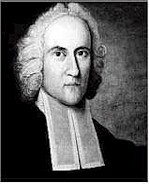In my next few posts I would like to address something that has become very real and personal for me in the past year: the divisions of the Christian body, especially in the Catholic and Protestant varieties. For me, the divisions used to be a problem like political views are problems. Most of us would like to see Democrats and Republicans work together to achieve more efficiency and effectiveness in government, but I'm not going to go home and weep about it if nothing happens. I tended to feel the same way about Christian differences. I had the attitude that well, we will all be together in heaven some day, we just have to be patient and it isn't a big deal. Well now it is a big deal. It's a big deal because these doctrinal divisions, unconscious prejudices, and cultural differences are now present in my marriage.
There is nothing like marriage to bring the abstract to the concrete very quickly. It's easy to have an ecumenical dialogue and write up a joint statement, and then go home to your wife. It's another matter entirely when your marriage is one continuous ecumenical dialogue.
Just to give a rather mild example, this morning I went to the Ash Wednesday service at St. Benedicts with Katie. The season of Lent, while not being limited to Catholicism, was never a part of my childhood faith. Now I am having conversations about the imoprtance of such things before I've even had my onion and cheddar bagel with jalepeno cream cheese.
While there are obvious difficulties with being married to someone who believes differently, I have found it to be a gift from God in so many ways. These pre-bagel theology sessions with my wife awaken me to a world of faith outside my little sphere. I am no longer able to retreat into my little evangelical world, and not think about the issues that divide and the reasons for them.
In the next few posts, I plan to spend some time looking at these differences. I want to look at them not only as abstractions and positions, but face the real question of why I remain Protestant. This isn't the 16th century. Is there truly anything to protest?
I will cut short my blog here. If you have suggestions (if anyone is reading this) on what topics should be covered, or questions please leave a comment and hopefully I can address them as I think through these things.
Wednesday, March 01, 2006
Subscribe to:
Post Comments (Atom)

2 comments:
Whew Timmy, this is some serious junk. I was (am sometimes still) of the same opinion that you were: we can have some nice conversations about who is right/wrong but in the end what's the big deal--we'll all end up in heaven together--the tolerant reformers! (which d. bloesch comments in a book that religious tolerance is an influence of the more pietistic reformers because of their emphasis on personal experience over dogma and the subjectivity that comes from that--so maybe you are just feeling your mennonite roots baby) And most of the time I just figured I was protestant because I grew up protestant. But in the past 2 years I have had the growing awareness that doctrinally I am protestant for at least two particular reasons: 1. The nature of revelation and grace. I guess that could be two reasons itself, but basically the question concerns the giveness of God. Does God give himself in a way that he becomes purely an object to humanity, or is God always both the object of being known and importantly the one making himself known-the subject? I guess this could take up ideas like natural theology and infused righteousness. This can also be a question posed to many protestant too who claim that God has given himself completely in the Bible. And 2. The nature and importance of faith. Is the vehicle for the subjective human side of receiving God's grace faith or sacrament? Do we participate in God's work by grace through faith or do the sacraments contain the grace in and of themselves which when partaken of communicate this to us? I think those would be some of the foundational things for me doctrinally. Apart from that there is much to long for that the Catholic Church offers by way of tradition and community etc. Maybe these questions can get us started--
EZE,
As always, ever so insightful. I am going to address your questions and 2 reasons in my next post.
Post a Comment